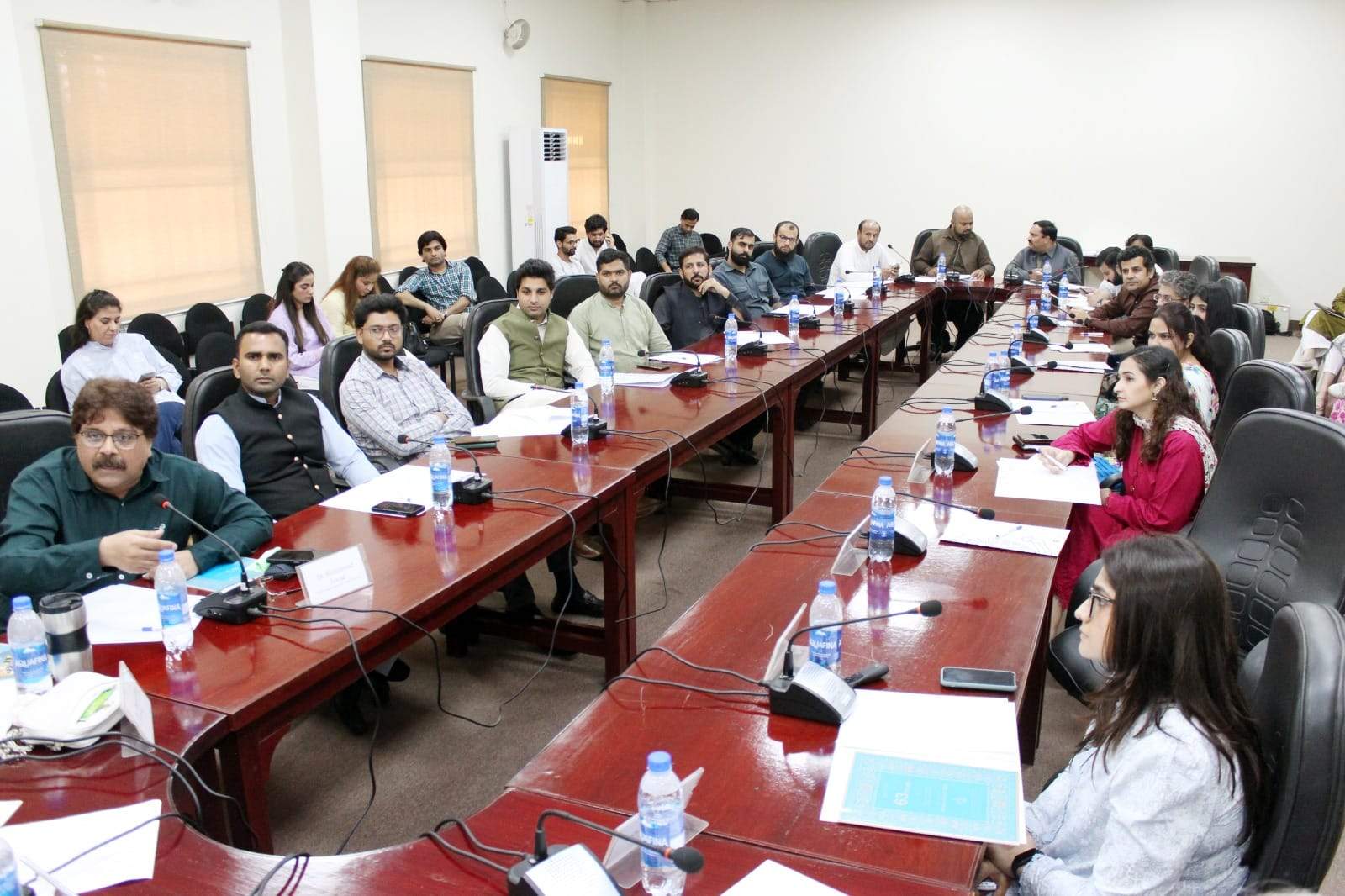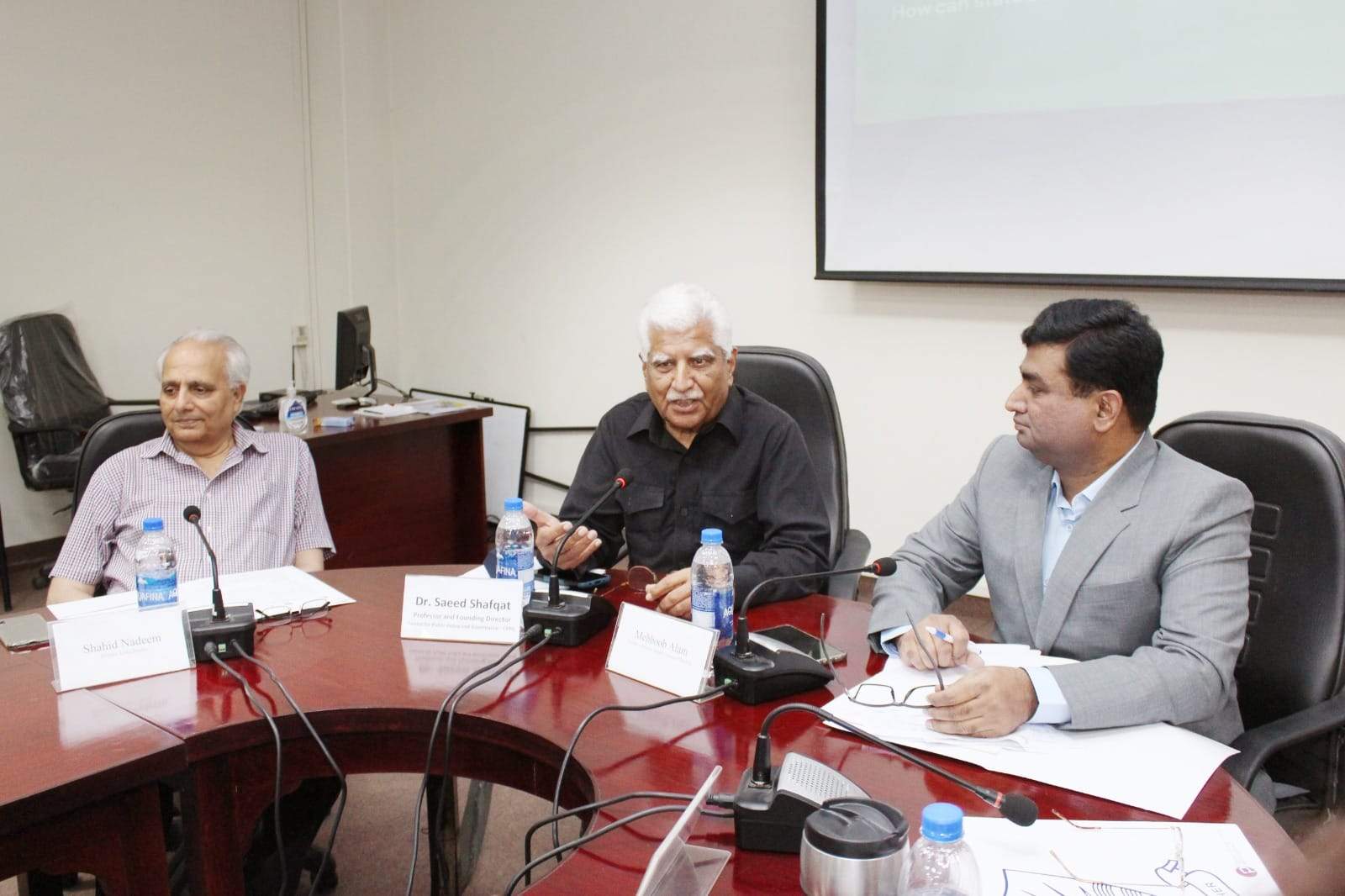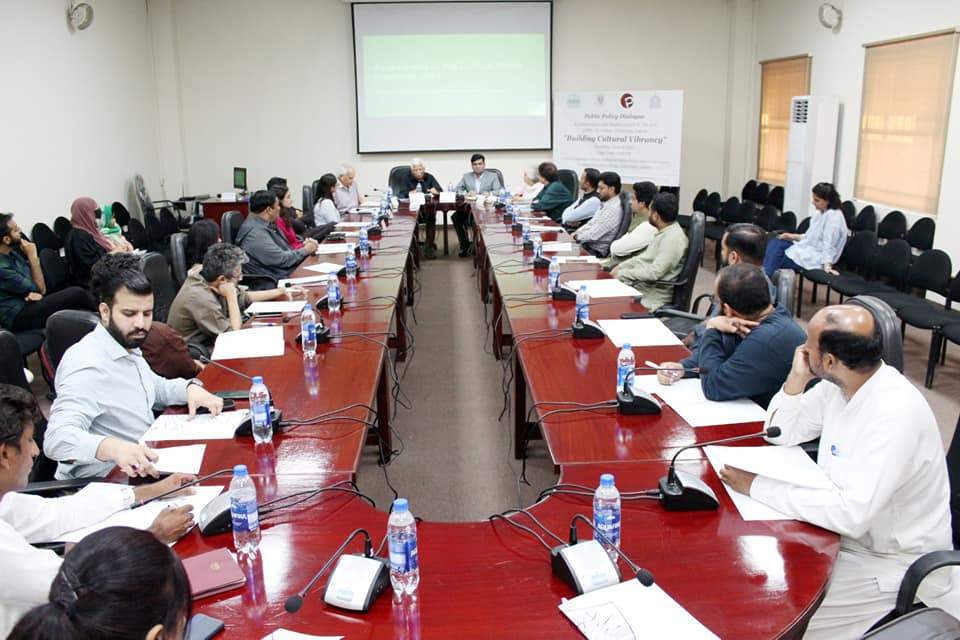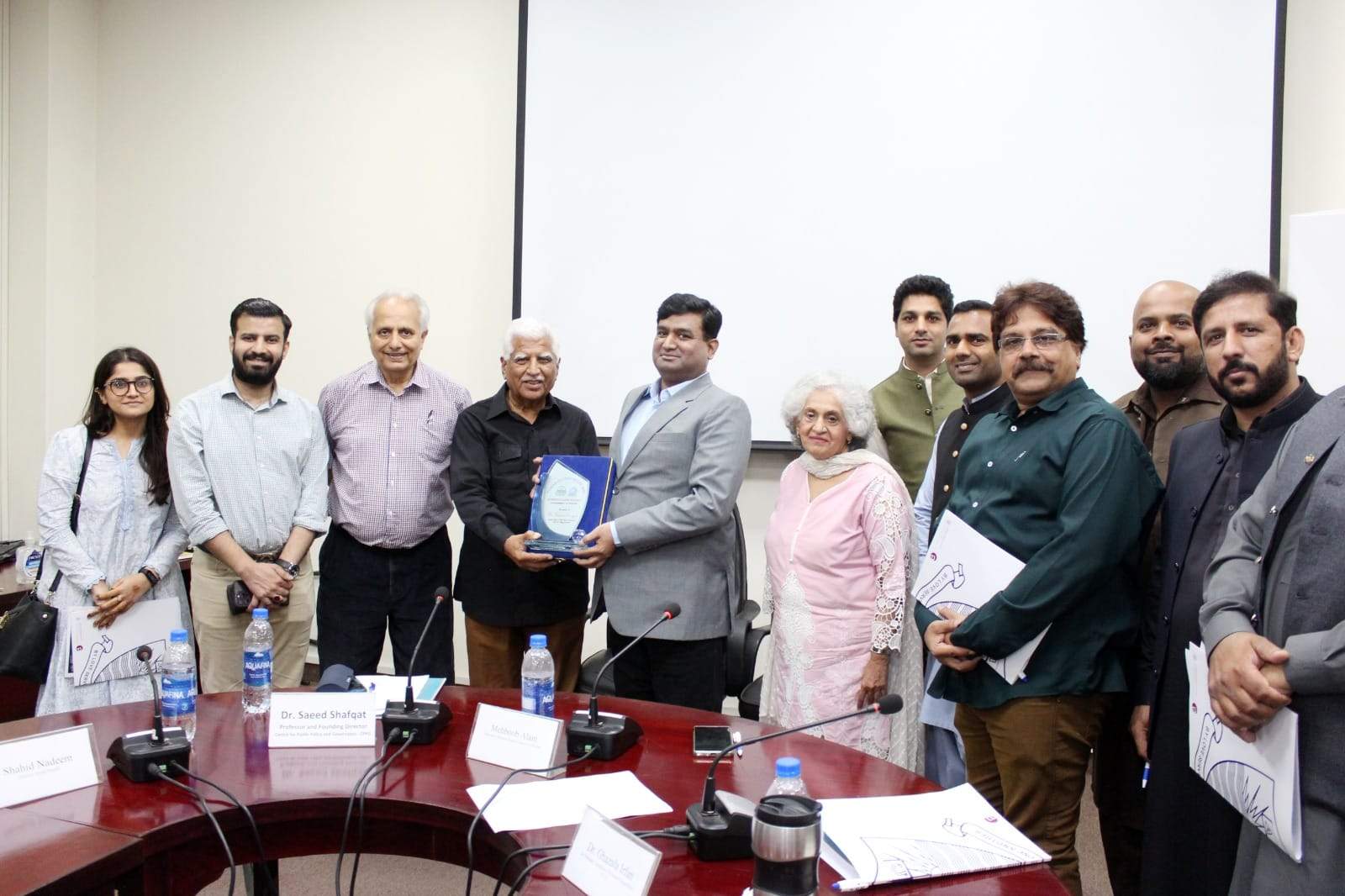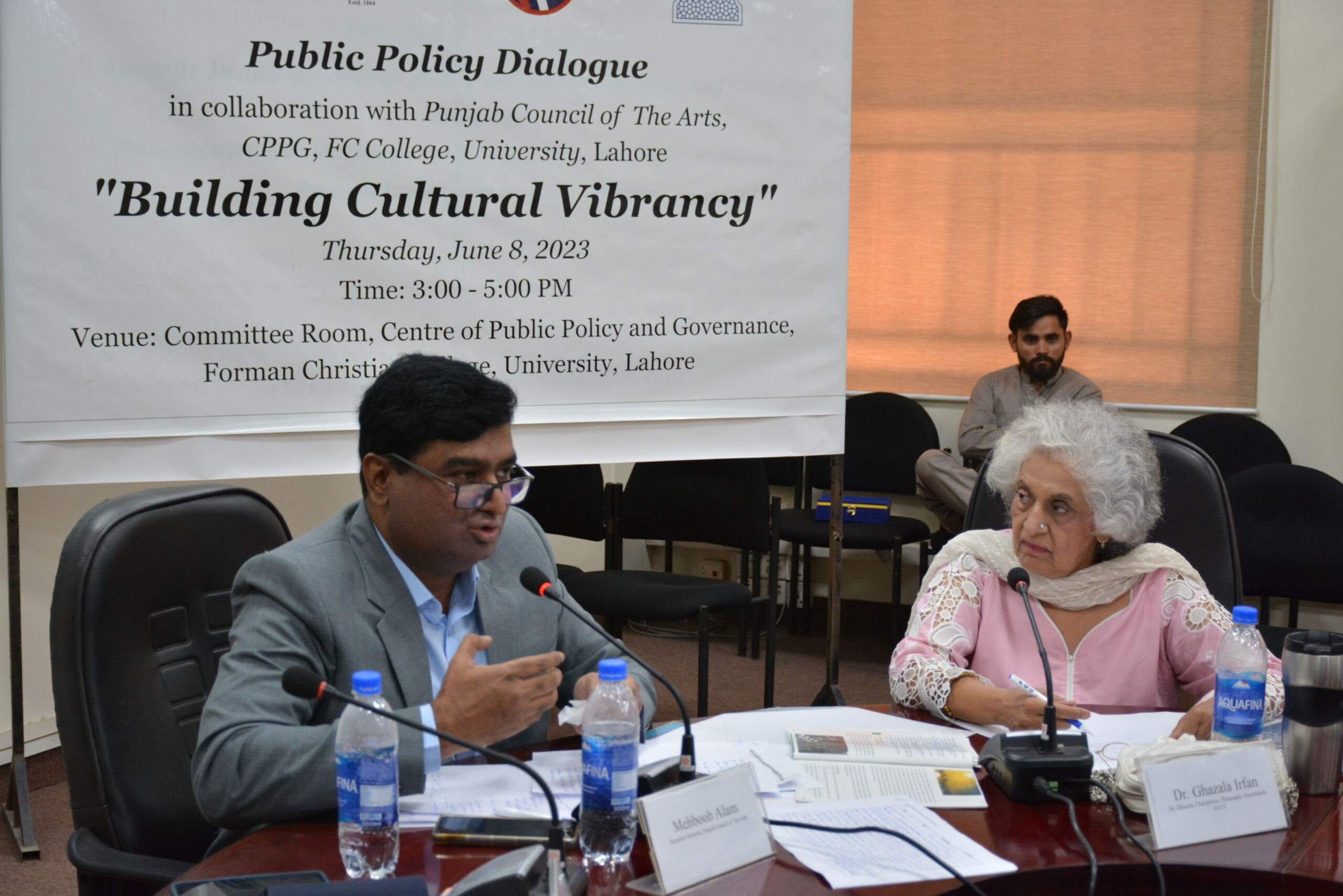
Building Cultural Vibrancy Through Performing Arts
Policy Dialogue
Past Event
Jun 8, 2023 - 11:00 am |
Jun 8, 2023 - 1:00 pm
Mehboob Alam
E-002 CPPG FCCU
Upcoming Event
On June 8th, 2023, the Centre for Public Policy and Governance (CPPG), in collaboration with the Punjab Council of the Arts, organized a Policy Dialogue on “Building Cultural Vibrancy Through Performing Arts.” The event aimed to explore the role of performing arts in promoting cultural vibrancy and facilitating socio-economic development. The panelists included Shahid Mahmood Nadeem, Director of Ajoka Theater; Dr. Ghazala Irfan, Chairperson of the Philosophy Department at FCCU; Mehboob Alam, Director-General of the Punjab Council of Arts; and M. Jawad, Head of the Philosophy Department at Punjab University.
The dialogue commenced with opening remarks by Dr. Saeed Shafqat, Founding Director of CPPG, who emphasized the significance of culture and culture policy in fostering social cohesion and nation-building. The audience was then presented with research findings by Ibra Ammad, an MPhil graduate of CPPG. Her presentation shed light on factors that have led to the neglect of culture in policymaking in Pakistan. Ibra discussed cultural policy’s historical context, highlighting unsuccessful attempts and subsequent drafts that lacked effective implementation.
She pointed out that the Information & Culture Department Punjab, successfully drafted and approved a Culture Policy in 2021, focusing on the optimization of cultural resources, the protection and promotion of cultural bodies, and the economic benefits associated with the development of art and culture. The policy specifically addressed the performing arts sector, aiming to support its growth as a viable industry and emphasizing its role in social development. International examples were cited to underscore the importance of integrating culture at the policy level.
Based on her research findings, Ibra Ammad put forward several recommendations. Encouraging cultural activities that foster expression, positive debates, and theatre plays with social content was highlighted. Increased citizen participation in local cultural activities, introduction of cultural languages in schools across Punjab, facilitation of foreign artists to conduct workshops, and incorporation of performance arts in the core curriculum were suggested to enhance cultural vibrancy. Business support through corporate social responsibility (CSR), recognition of performing arts as a viable profession, and financial support for artists and institutions were also emphasized. Social protection for veteran artists, promoting a pro-culture consensus, accessible funding, and a policy that balances censorship and freedom of expression were among the other recommendations put forth.
Shahid Mahmood Nadeem shared his insights, emphasizing that art unites people and plays a crucial role in society. He called for a change in mindset and emphasized the need to sensitize government officers, ensure recognition and respect for artists, preserve arts and artists, and foster collaboration among all stakeholders.
Dr. Ghazala Irfan highlighted the challenges faced by musicians and the lack of state patronage. Despite these challenges, she stressed the importance of society’s support and initiatives for artists to survive and thrive.
Dr. M. Jawad emphasized the need for conjectural creativity through theory building, training in the aesthetics of performing arts, and engagement with civil society. Collaboration among all stakeholders was also deemed essential.
In the concluding remarks, Mehboob Alam, Director General, Punjab Council of the Arts, highlighted the Performing Arts Academy launched by PUCAR for training and skill development. He emphasized the importance of pluralism, multicultural policies, tolerance, and coexistence. The need for activities supporting artists, the establishment of studios, capacity building through training courses, and the formation of a committee to enhance organization and coordination were stressed.
During the question-and-answer session, concerns were raised about delayed payments and breaches of contracts in the industry. The potential of technology to empower artists and the need for associations and organizations to support the artist community was also discussed. Issues such as the absence of minimum wages, irregular working hours, and the declining presence of music in Pakistan were also pointed out.
Recommendations included sensitizing students to consume, produce, and appreciate art. Curb rising censorship practices, improving execution, providing better training, fostering a conducive environment through societal, governmental, and artist community support, organizing tours and festivals, and establishing public-private partnerships for sponsorship.
The participants considered Policy Dialogue on “Building Cultural Vibrancy Through Performing Arts” an important collaborative initiative for fruitful discussions and generated recommendations to promote cultural vibrancy, support artists, and foster social development through performing arts. The recommendations from the dialogue will contribute to sustaining and enhancing Punjab cultural policy, promoting partnerships among academia, government, and civil society future, and aiming at cultivating a thriving cultural ecosystem in Pakistan.


